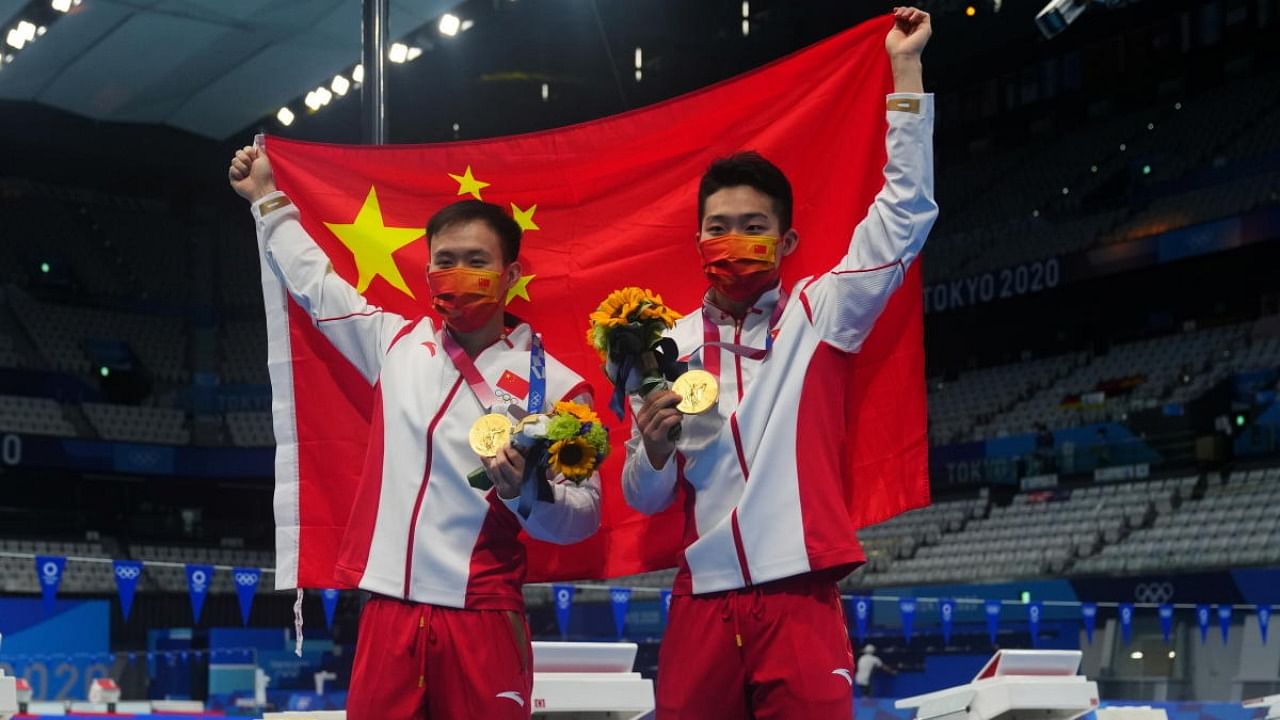
China's unrelenting domination of Olympic diving has rivals in Tokyo wondering not just how they can beat them, but also whether the country's approach is desirable or even healthy.
China have more or less cleaned up in Olympic diving over the last 30 years and even though their hopes of winning all eight golds at the Tokyo Games have gone, they can still match the seven from Rio in 2016.
So far at the pandemic-delayed Games they have taken three out of four diving titles, with Britain springing a surprise by grabbing the other.
Chinese divers competing in the Japanese capital have consistently talked about the hard work they put in and the support from the country's sports authorities, without going into much more detail.
But after winning the men's synchronised 3m springboard on Wednesday, Xie Siyi gave perhaps more insight than he intended when he talked about "very boring" training day after day and living with his team-mates in dormitories.
In unusually blunt terms for China's often guarded athletes, Xie added: "Every day we go from the dormitory to the training centre, then we go back to eat, then we go back to training, then we go back to sleep again."
On Tuesday, China easily won the women's 10m synchronised platform thanks to two teenagers: Chen Yuxi, 15, and Zhang Jiaqi, 17.
Eden Cheng, who along with partner Lois Toulson finished seventh of eight for Britain, is slightly older at 18.
Cheng believes China's success is down to the sheer number of hours that they train. But she has other considerations because she knows that her life will not always be diving.
"I've just finished school with my A-Levels (final school exams) so I have been a full-time student as well as diving," said Cheng.
"For them, they don't do much education, they are very focused on their sport.
"They do live at the pool. I've been to the national pool that one of the (Chinese) girls dives at and I've seen the facilities and what their life is like.
"It's nothing compared to what we do in Britain. They are definitely next level."
Other Olympic divers trying to keep up with the Chinese say it is also because, with the world's biggest population and a strong track record in the sport, China have such a vast selection of talent to pick from.
They also believe that the Chinese get into diving from a much younger age.
Chen and Zhang, the teenage Olympic champions, have been diving since they were four.
"For me, I just feel like a lot of them start really young," said Delaney Schnell, 22, who won silver behind the fearless Chinese pair. Schnell began diving at 10.
"In the US, not everyone starts young," she added.
"But their technique is also unbelievable. They train technique, technique, technique, and I think that's something that a lot of countries are trying to learn to do."
Patrick Hausding, whose bronze for Germany on Wednesday was his third Olympic medal, is a relative veteran at 32.
He said that he had been to China many times to compete and was always struck by how many children are diving and how prominent the sport is there compared to Germany.
"When you see them practising and the amount of little kids that they have coming through, there are so many," said Hausding.
But, picking his words carefully, he is wary of what he believes young Chinese divers can be subjected to.
"Hard work and discipline, but probably sometimes under the line (of) where it's healthy or where it's ok," he said.